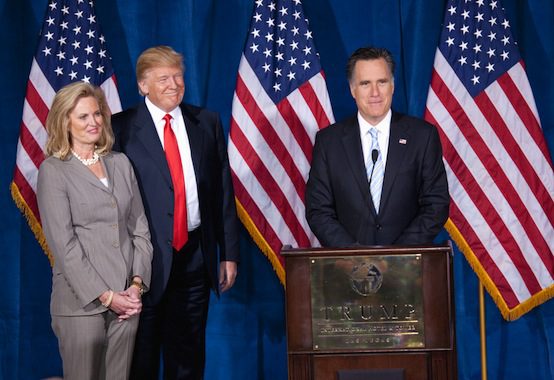An Echo, Not a Choice

A recent syndicated column by Peggy Noonan makes useful observations, together with one rather questionable point. Noonan blithely assumes that while the president has “fully absorbed the general assumptions and sympathies of the political left,” his opponent Mitt Romney reflects “the general attitudes, assumptions and sympathies of the political right.”
Noonan may be seeing something in Romney that eludes me. Of course, she can find support for her view in the invectives of those liberal journalists, who have begun to depict the former Massachusetts governor and Republican nominee as an incipient fascist. But the right-wingers I meet, who are the ones who tried to keep Romney from winning the nomination, do not believe that he shares their “general attitudes, assumptions and sympathies.” They are going along with the candidate of the GOP regulars and Noonan’s Wall Street Journal because they think Obama may be worse.
Despite this undeserved plug for her newspaper’s editorial choice, Noonan does correctly underline the foolishness of Obama’s recent straying in the direction of the hardline social left. She notes that Obama is “actively bad in politics,” as opposed to being a politically clever ideologue. “Anyone good at politics does not pick a fight with the Catholic Church during an election year.”
“If you’re good at politics but ideologically mean, you string the church along during election year” and then “revoke all protections in 2013, after you’ve been reelected.” Noonan believes Obama’s “campaign is making him look small and scared,” particularly when he forces his ally, Newark mayor Cory Booker, to retract a statement criticizing one of Obama’s recent assaults on equity companies.
It seems that outside of grievance-driven constituencies and friends in the entertainment industry, Obama may be looking at an increasingly restricted electoral base. But his ineptitude may be even worse than Noonan suggests. As a still personally popular executive in a country that has swung leftward culturally and socially, Obama should be able to win in a cakewalk.
But he has frustrated his own efforts. His economic policies have been disastrous; his attempts to blame all his predictable disasters on a Republican administration that went away three and a half years ago borders on the hallucinatory; and his recent attempts to go for broke on leftist social issues, are all causing his lead over Romney to slip. He is clearly losing what political scientists like to call “the undecided center.”
Noonan also observes, however, that Romney has trouble distancing himself from the last GOP president. Romney is opening himself to the charge of being “just more Bush” and “peddling the same medicine that helped make us sick.” Although Noonan is applying this criticism mostly to the way Romney studiously avoids bringing up Bush’s runaway spending while attacking Obama’s extravagance, her observation is true about Republican presidential politics generally.
Bush’s people never departed the public scene following his unsuccessful presidency. They continued to run the GOP media, like the WSJ editorial page and Fox News. And this continuity makes the prospect of a Republican victory unpalatable to some Americans, including this columnist. A Romney presidency would likely put back into power Bush’s neoconservative foreign policy team, and it would hardly surprise me to see Karl Rove creep back into the White House as a presidential advisor.
The persistence of the mentality of the Bush presidency among Republicans was brought home to me recently while looking at a statement of belief distributed to Young Republicans on college campuses. One of the stated beliefs is as follows: “I believe in a strong national defense to ensure that America remains safe, terrorists are defeated, and democracy flourishes throughout the world.”
While I’m certainly in favor of maintaining strong defense to keep our country safe, the reference to saving us from terrorists may be pushing the incorrect idea that we’ve been in imminent danger of terrorist attack since Bush left office. But there is no indication that domestic terrorism has become a worse problem under the Democrats. What takes the cake as a blast from the GOP past is the call to use our military to impose our political preferences on the entire world. Can’t the GOP retire the stale rhetoric of Bush’s speechwriter Michael Gerson, which was particularly evident during Bush’s second term? Has the hope of Bush and Gerson to convert all of humanity to state-of-the-art American democracy now become part of a credo that adolescents are supposed to recite, like a religious catechism?
I’m afraid this may be the case, as long as the same broken records from the Bush presidency continue to shape Republican thinking about the rest of the world.
Paul Gottfried is the author, most recently, of Leo Strauss and the Conservative Movement in America: A Critical Appraisal.
Comments